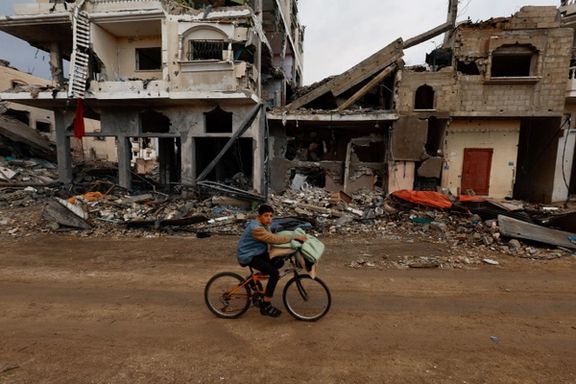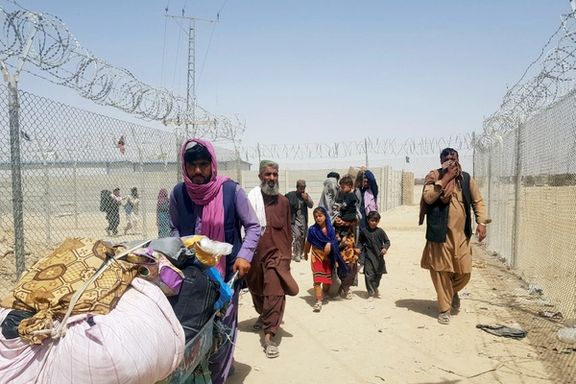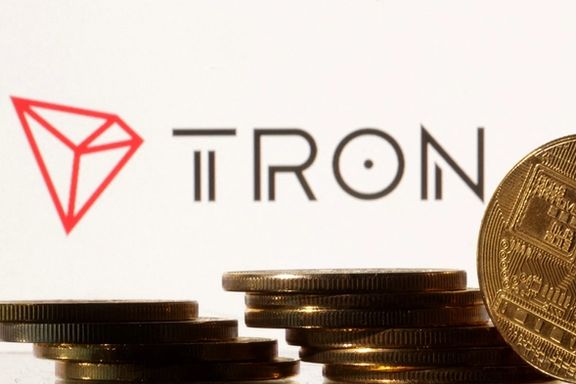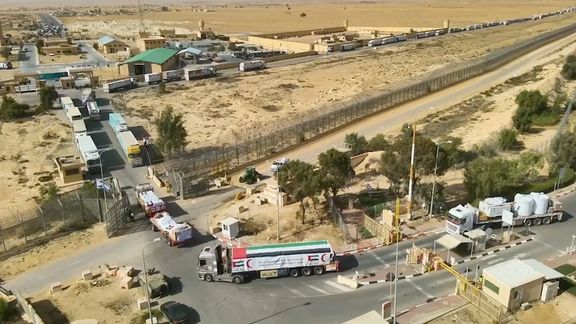Iranian Officials Urge Lasting Israel-Hamas Ceasefire

As Hamas managed to extend the ceasefire with Israel, Iranian officials are ratcheting up their rhetoric to exert pressure on Israel to accept longer paused.

As Hamas managed to extend the ceasefire with Israel, Iranian officials are ratcheting up their rhetoric to exert pressure on Israel to accept longer paused.
Former Revolutionary Guard commander Mohsen Rezaie issued a warning on Monday, stating, "If Israel initiates war, there will be no obstacle or excuse left for the free people of the world to seek harsh revenge."
However, Israeli Prime Minister Benjamin Netanyahu emphasized over the weekend that when the truce ends, Israel will “return with full force to achieve our goals: the elimination of Hamas," the only reason there is a pause in fighting to secure the release of the hostages.
The current round of fighting in Gaza is the worst since Hamas took control of the strip in 2007, and began on October 7 when Iran-backed Hamas militia invaded Israel, murdering at least 1,200 mainly civilians and taking at least 240 more hostage.
Iranian officials have consistently supported Hamas since the October 7 terror attack and its proxies have stepped up activities from Iraq, Yemen, Lebanon and Syria.
Mediator Qatar said on Monday a truce between Israeli and Hamas forces in Gaza had been extended by two days, continuing a pause in seven weeks of warfare.
The total number of hostages released by the militant group since Friday is 58, including foreigners. In return, Israel freed 39 teenage Palestinian prisoners on Sunday, bringing the total number of Palestinians released under the truce to 117.Under the terms of the current deal, Hamas is due to release in total 50 Israeli women and children held hostage in Gaza. There is no limit in the deal on the number of foreigners it can release.
An Israeli government spokesperson said the total number of hostages still held in Gaza on Monday was 184, including 14 foreigners and 80 Israelis with dual nationality.

Over 24,000 illegal Afghans have been expelled from Iran by border guards amid rising calls to prioritize the needs of Iranian citizens amid the economic crisis.
The Commander of the Border Guards in Khorasan Razavi province, Majid Shojai, stated on Monday that “within the past 10 days, the individuals, present in the country illegally, were identified and handed over to the Afghan government's representative at the zero point of the Dogharoun region.”
Khorasan Razavi province, sharing a 531-kilometer border with Turkmenistan to the north and northeast and a 302-kilometer border with Afghanistan to the east, has been a focal point for border control.
Simultaneously, a member of parliament, Abolfazl Aboutorabi, proposed measures to penalize those renting houses or providing employment to “unauthorized foreign nationals”. According to Aboutorabi, both Iranian landlords and employers who engage unauthorized foreign nationals will face legal consequences.
Critics claim that amidst the country's economic crisis, focus should be on supporting Iranian citizens before refugees and immigrants.
Hassan Ramazani, another parliamentarian, recently claimed, based on statements from Iran's Minister of Labor, that approximately five million jobs are currently held by foreign nationals, particularly Afghan residents in Iran. The assertion comes at a time when official statistics from the Statistical Center of Iran indicate the loss of nearly 900,000 jobs in the country since 2018.
Accusations of Afghan refugees contributing to unemployment in Iran coincide with reports of significant foreign investments by Afghan migrants and traders. The Iranian Foreign Investment Association's statistics reveal that in the first half of this year alone, the country attracted $2 billion in foreign investments, with Afghan migrants ranking first in terms of the number of investments.

The Instagram accounts of Iranian actress Maryam Masoumi and Setareh Masoumi, the wife of football player Mehdi Ghayedi, have been blocked due to the publication of photos without hijab.
Maryam Masoumi's account, boasting one million and 300 thousand followers, and Setareh Masoumi's account, with 578 thousand followers, were both affected by the suspension.
On Maryam Masoumi's page, a photo with a caption said, "This page has been suspended on the order of the judicial authorities by the Public Security Police."
Similarly, a photo on Setareh Masoumi's page conveyed that the page was blocked "according to the order of the judicial authorities, due to the publication of criminal content."
The blocking occurred while Mehdi Ghayedi and his spouse are currently residing in Dubai. The key issue revolves around how these accounts were blocked without gaining access to Instagram's internal system. While the exact details remain uncertain, the most plausible scenario is that the account owners were requested to provide their passwords, following which the accounts were blocked.
In response to the incident, Fars News Agency, affiliated with the Revolutionary Guards, reported on Monday that the reason for Maryam Masoumi's page suspension was attributed to "the young actress's use of images with inappropriate clothing."
The development is part of a broader trend where many Iranian women, including notable figures, consistently share photos without mandatory hijab on social networks.
The police, particularly after the Woman, Life, Freedom protests have taken measures to curtail the activities of individuals who defy mandatory hijab, leading to detentions in some cases.

Prices for essential food items continued to grow in Iran last month, with red meat registering an 82-percent jump compared to the same month one year ago.
The galloping inflation report published by the Statistical Center of Iran (SCI), a government outfit, comes after warnings last week that a $14 billion government outlay for importing food and medicine next year will be insufficient to address needs.
In Iran’s closed economic system importers have no direct access to foreign currencies and can only receive US dollars or euros from the government. Local media have pointed out that $14 billion proposed in next year’s budget for food and medicine would only be enough for importing essential food such as grains and protein sources but cannot also pay for medicine.
According to the SCI report, other food items also experienced serious inflation. Prices of fish increased by 72 percent compared with prices in October-November 2022. Overall, the point-to-point inflation rate for a basket of essential daily needs was almost 40 percent.
Other recent reports have put the inflation rate at more than 50 percent. Also, overall inflation for retail food prices was reported to be 37 percent.
Despite higher oil exports this year, the Iranian government seems unable to lower inflation and its restrictive foreign currency policies continue. The national currency rial, still hovers around its all-time low of 500,000 per US dollar, a 12-fold fall in value since early 2018 when the United States withdrew from the JCPOA nuclear deal and imposed economic sanctions on Iran.

The exact amount of oil revenues is a state secret, but it is believed Iran is selling Cina around 1.1 million barrels of oil per day, with large discounts. Experts estimate that with the discount, and additional costs related to the illicit shipments of oil, Iran is probably receiving around $50 per barrel, which would mean $21 billion of income per year, hardly enough to finance the food imports and other needs. Other Iranian oil shipments to Venezuela or Syria hardly return any hard currency to Tehran’s coffers.
This is why next year’s draft budget bill presented to parliament has increased taxes to deal with persistent deficits.
The government has projected a 50-percent increase in taxes of various kind compared to the current budget. Total expected tax revenues will reach over 11,220 billion rials ($22.44 billion), Jahan-e-Sanat said. This would be equal or greater than the annual oil income.
The total government budget will reach 24,620 billion rials ($49.2 billion) next year, which shows an increase of 18.2 percent compared to this year’s budget, the report added. That is to say, the tax revenues will account for more than 45 percent of the Iranian government’s operating budget.
The inflation rate in Iran has stayed at or above 40 percent for at least three years, increasing political instability. After last year’s anti-government unrest, more economic protests are taking pace in recent weeks. Workers in different sectors and retires of state enterprises stage daily protests demanding higher pay, as millions of previously middle-class people are now considered poor. Next years budget, forecasts a 16-percent pay increase for workers, less than half of the current rate of inflation.

A new front has emerged in Israel's fight against the funding of Iran-backed militant groups from Hamas to Hezbollah: A fast-growing crypto network called Tron.
Quicker and cheaper than its larger rival Bitcoin, Tron has overtaken its rival as a platform for crypto transfers associated with groups designated as terror organizations by Israel, the United States and other countries, according to interviews with seven financial crime experts and blockchain investigations specialists.
A Reuters' analysis of crypto seizures announced by Israeli security services since 2021 reflects the trend, showing for the first time a sharp rise in the targeting of Tron wallets and a fall in Bitcoin wallet seizures.
"Earlier it was Bitcoin and now our data shows that these terrorist organizations tend to increasingly favor Tron," said Mriganka Pattnaik, CEO of New York-based blockchain analysis firm Merkle Science, citing Tron's faster transaction times, low fees, and stability.
Merkle Science says it counts law enforcement agencies in the United States, Britain and Singapore as clients.
Israel's National Bureau for Counter Terror Financing (NBCTF), which is responsible for such seizures, froze 143 Tron wallets between July 2021 and October 2023 that it believed were connected to a "designated terrorist organization" or used for a "severe terror crime," the Reuters analysis found.

The Oct. 7 attacks by Hamas on Israel killed around 1,200 people. Israel's subsequent bombardment and ground invasion of Gaza has killed thousands of people. In its response, Israel has also stepped-up scrutiny of Hamas' financing.
Contacted by Reuters with a summary of this article, Hayward Wong, a spokesperson for British Virgin Islands-registered Tron said all technologies could "in theory be used for questionable activities," citing as an example US dollars being used for money laundering.
Wong said Tron did not have control over those using its technology and that it was not linked to the groups identified by Israel.
Almost two-thirds of Israel's Tron seizures – 87 - were this year, including 39 wallets that Israel said in June were owned by Lebanon's Hezbollah, and 26 it said in July belonged to Palestinian Islamic Jihad, a Hamas ally that joined the assault on Israel from Gaza.
The seizures have also included 56 Tron wallets NBCTF said were linked to Hamas, including 46 in March last year it connected to a single Gaza-based money exchange company called Dubai Co. For Exchange.
Weeks after the Hamas assault, Israel announced its biggest known seizure of crypto accounts yet, freezing around 600 accounts it connected to Dubai Co., without stating which crypto networks or coins were used.
More than a dozen people whose funds were frozen in that seizure told Reuters they had been using Tron. They said they traded crypto to help their business or personal finances and denied any connection with Hamas or Islamic Jihad.
One of the people, who identified themselves only as Neo, said it was possible they had transferred money on one occasion to somebody associated with Hamas.
Israel calls Dubai Co. a terrorist group "due to the aid that they provide to the Hamas terrorist organization, particularly its military arm, in transferring funds on a scale of tens of millions of dollars a year."
A representative for Dubai Co., whose email was listed on the seizure order, did not respond to a request for comment.
The armed wing of Hamas, which had raised crypto funds since at least 2019, said in April it would cease Bitcoin fundraising, citing increased efforts to prevent donations. Hamas did not mention Tron in the statement.
Reuters could not independently determine whether Hamas had used Tron. NBCTF declined to comment for this story, including about its understanding of the shift to Tron and how it linked the wallets to the militant groups. Hamas, Hezbollah and Islamic Jihad did not respond to requests for comment.
Six people listed on Israel's previous Tron seizure notices who responded to Reuters questions denied connections to militant groups. They included people based in Venezuela, Dubai and the West Bank city of Jenin.
'AXIS OF RESISTANCE'
In the June statement, Israel said it seized funds "intended for use by the terrorist organizations financed by Iran." Iran counts Hamas, Hezbollah and Islamic Jihad in a so-called Axis of Resistance opposing Israeli and American power in the Middle East.
In the seizure statements, NBCTF did not affirm Tehran was the source of the funding. Iran's foreign ministry did not respond to a Reuters request for comment about using Tron to fund groups it supports.
Iran has previously used Tron to skirt US sanctions. Reuters reported last year that Iranian firms used it for $8 billion in transactions between 2018 and 2022.
Estimates of the sums of money that reach proscribed groups through crypto are unreliable because it is hard to say whether money sent to seized wallets was really destined for those groups.
The value of crypto transactions and the digital wallet addresses used for them can be traced on the blockchain - a public ledger that underpins crypto. However, it is hard for those outside law enforcement or crypto trading platforms to know the real identity of those involved in the transactions.
The people Reuters consulted additionally said their research showed the cryptocurrency Tether was dominant across the Tron network.
Tether, the world's biggest so-called stablecoin, is backed by reserves and aims to keep a 1:1 peg with the dollar. The company said in a statement that it regularly traced and froze tokens "used for nefarious purposes," and coordinated these efforts with law enforcement.
Tether is the third-largest crypto token, with a market value of $89 billion, up by around a third in the past year, according to CoinGecko data.
Despite its lack of name recognition outside crypto circles, Tron is the dominant blockchain for Tether transactions, currently hosting $48 billion of the tokens, according to Tether's website. Average daily transactions on Tron hit 9.1 million from April-June, according to data firm Messari, up over 70% from the same period last year.
Justin Sun, who founded Tron in 2017, was sued by the US Securities and Exchange Commission in March for allegedly artificially inflating trading volumes and selling Tron tokens as an unregistered security. Sun said the SEC charges "lack merit."
Binbin Deng, a representative of Sun, referred Reuters to Tron spokesperson Wong's statement.
'BLINDSPOT'
Since its 2008 birth, the Bitcoin blockchain, and since then crypto more widely, have been magnets for criminals drawn by liquidity and a reputation for anonymity. Of all crypto transaction volumes, the illicit share was 0.2% in 2022, down from 2% three years earlier, according to blockchain tracker Chainalysis.
In Israel, Bitcoin seizures have been scarce by comparison with Tron. In 2021, the first year NBCTF published seizure notices, it froze 30 Bitcoin wallets. No Bitcoin wallets appear in notices in the subsequent years.
The Financial Action Task Force, a Paris-based G7 body that fights illicit finance, warned last month that terrorist organisations were seeking to further boost donor anonymity, citing the growing popularity of Tether transfers on Tron.
Four of the people consulted by Reuters said law enforcement's increased capability to trace transactions on Bitcoin was driving such groups to Tron.
Tron initially drew less attention from blockchain analysis firms, said Shlomit Wagman, a senior fellow at Harvard University who was director-general of the Israel Money Laundering and Terrorism Financing Prohibition Authority from 2016 to 2022.
"There was until now this blindspot," she said.
Transaction fees on Tron cost far less than on Bitcoin, U.S. investment firm VanEck says. Militant groups were also using stablecoins on Tron instead of more volatile bitcoin tokens to ensure the "value of their crypto is being preserved," Wagman said.
(Report by Reuters)

As the temporary ceasefire between Israel and Hamas enters its final day, the militant group is actively seeking an extension.
The ceasefire, initiated on Friday, has resulted in the release of dozens of hostages, with over 100 Palestinian prisoners held on terror charges freed by Israel as part of the agreement.
Hamas is pushing for an extended truce, to give the group time to regroup amidst the devastation inflicted by Israel's relentless retaliation for its massacre of October 7. The designated terror group killed 1,200 mostly civilians and took 240 or more hostage in Gaza.
However, in spite of the fact that over 14,000 Gazans have been killed, including top Hamas commanders, and half of the strip now turned to rubble, Ali Fadavi, the deputy commander of the Islamic Revolutionary Guard Corps (IRGC), asserted on Monday that the Israeli military's perceived invincibility has diminished.
"The invincible image that Israelis had portrayed for military dominance collapsed," he said. "Several hundred individuals breached its seemingly impregnable walls, penetrating tens of kilometers into occupied Palestine."
Israeli Prime Minister Benjamin Netanyahu, addressing his forces in Gaza, conveyed a resolute stance on Sunday, stating that once hostages are released, "Nothing will stop us." He said while the hostage release continues, he would agree to one additional day for every 10 captives released but vowed to continue the war until Hamas is eradicated from the strip.
While Iran takes credit for supporting Hamas financially and militarily over the past two decades, it has refrained from direct military involvement in the current conflict. Instead, its proxies have taken the front line. Even amidst the ceasefire, Lebanese Hezbollah has continued its aggression on Israel's northern border and Yemen's Houthis have taken further actions on vessels in the Red Sea.